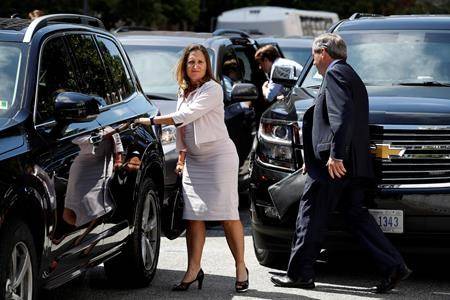With a Friday deadline looming, Foreign Affairs Minister Chrystia Freeland is donning her best poker face as U.S. President Donald Trump’s blunt assessment of the NAFTA talks — spoken in confidence but leaked to the media — lands with a thud on the negotiating table.
Trump, in a conversation Thursday with Bloomberg News, gave a dismissive off-the-record assessment of the Canadian position on major NAFTA sticking points that was leaked to the Toronto Star newspaper and published Friday morning.
“If I say no — the answer’s no. If I say no, then you’re going to put that, and it’s going to be so insulting they’re not going to be able to make a deal … I can’t kill these people,” Trump said of the Canadian government, according to the Star report, which cited an anonymous source.
Any deal with Canada would be “totally on our terms,” Trump was quoted by the Star as saying. The newspaper said Bloomberg has not disputed the authenticity of the comments.
Freeland emerged from the morning’s talks just minutes after news of Trump’s remarks rippled through the media corps gathered outside the offices of the U.S. trade representative, where the negotiations have been taking place all week.
Despite repeated questions about whether the comments risked scuttling the talks, a stoic Freeland maintained her diplomatic countenance, saying only that both the Canadian negotiating team and USTR officials were working hard to reach an agreement.
“We’re not there yet,” she cautioned.
READ MORE: Fraser Valley farmers worry NAFTA deal could affect livelihoods
Asked directly about Trump’s remarks and whether the Americans are bargaining in good faith, Freeland walked a diplomatic tightrope.
“Ambassador (Robert) Lighthizer and his team, throughout this negotiation, have been working really, really hard,” she said.
“Our starting positions at the beginning were very far apart. I think, at this point, we know what each side needs and we’re working hard to find a way. My jobs it to find the deal that works for Canada…
“Bob and I joke sometimes that we could switch chairs we know each other’s positions so well. And we’re working hard to find that win-win space.”
Speaking to reporters Friday in Oshawa, Ont., Prime Minister Justin Trudeau was asked about the reports on Trump’s off-the-record comments.
Trudeau said that “over the past year and a half there’s a lot of things that have been said from time to time.”
He wouldn’t comment on the obstacles that remain and reiterated he won’t negotiate in public.
“I think people have noticed that our government’s approach is always to stay constructive, positive, to engage on the substance of issues and to demonstrate that we understand that the path forward is one of making sure that there’s win-win-win on all sides,” Trudeau said.
“We’re going to remain constructive, positive, serious and creative about what we do around the negotiating table… We are also going to be unequivocal about always standing up for Canadians’ rights and Canadians’ interests.”
READ MORE: Canada, U.S. see common ground on autos as three-way NAFTA talks resume
Earlier in the day, both Canadian and American negotiators were showing few signs of budging on their most stubborn NAFTA positions as the day of Trump’s Friday deadline began.
A statement from the U.S. trade representative’s office said Canada had made no compromises to the American side on the thorny issue of dairy-market access: “there have been no concessions by Canada on agriculture,” it read.
Similarly, Canadian officials told The Canadian Press on Friday that expectations a NAFTA deal is imminent are exaggerated and premature.
Freeland has been in meetings all week with her American counterpart. They met late into the evening Thursday, until the talks ended abruptly just after 10 p.m. ET.
This week’s new round of U.S.-Canada negotiations had generated hopeful signals from both camps that a deal could be struck by the end of the week — but difficult discussions about dairy and dispute settlement remain, and were holding back progress on Friday morning.
Trump has repeatedly criticized Canada’s dairy industry and has used the threat of tariffs on Canada’s auto production to push for concessions. But Canada’s dairy industry is adamant that it won’t stand for the government allowing the U.S. any more market access, saying it has compromised enough on past trade deals with the European Union and Pacific Rim countries.
Another lingering sticking point is Chapter 19, set up to resolve disputes among the three countries and industry around how to implement NAFTA rules. The U.S. wants it out of the deal, but Canada says it must be included.
Trudeau held a conference call Thursday with premiers to discuss trade-offs, and in a statement said the federal government was committed to winning the best possible terms for Canada.
The Canadian Press



